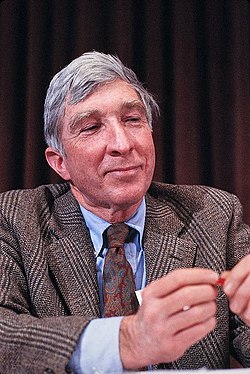John Updike Quote
Dabbling in the sandbox gives Rabbit a small headache. Over at the pavilion the rubber thump of Roofball and the click of checkers call to his memory, and the forgotten smell of that narrow plastic ribbon you braid bracelets and whistlechains out of and of glue and of the sweat on the handles on athletic equipment is blown down by a breeze laced with children's murmuring. He feels the truth: the thing that has left his life has left irrevocably; no search would recover it. No flight would reach it. It was here, beneath the town, in these smells and these voices, forever behind him. The fullness ends when we give Nature her ransom, when we make children for her. Then she is through with us, and we become, first inside, and then outside, junk. Flower stalks.
Dabbling in the sandbox gives Rabbit a small headache. Over at the pavilion the rubber thump of Roofball and the click of checkers call to his memory, and the forgotten smell of that narrow plastic ribbon you braid bracelets and whistlechains out of and of glue and of the sweat on the handles on athletic equipment is blown down by a breeze laced with children's murmuring. He feels the truth: the thing that has left his life has left irrevocably; no search would recover it. No flight would reach it. It was here, beneath the town, in these smells and these voices, forever behind him. The fullness ends when we give Nature her ransom, when we make children for her. Then she is through with us, and we become, first inside, and then outside, junk. Flower stalks.
Related Quotes
I believe the best service to the child is the service closest to the child, and children who are victims of neglect, abuse, or abandonment must not also be victims of bureaucracy. They deserve our de...
Some of the most evil human beings in the world are psychiatrists. Not all psychiatrists. Some psychiatrists are selfless, caring people who really want to help. But the sad truth is that in today's s...
About John Updike
Hundreds of his stories, reviews, and poems appeared in The New Yorker starting in 1954. He also wrote regularly for The New York Review of Books. His most famous work is his "Rabbit" series (the novels Rabbit, Run; Rabbit Redux; Rabbit Is Rich; Rabbit at Rest; and the novella Rabbit Remembered), which chronicles the life of the middle-class everyman Harry "Rabbit" Angstrom over the course of several decades, from young adulthood to death. Both Rabbit Is Rich (1981) and Rabbit at Rest (1990) were awarded the Pulitzer Prize.
Describing his subject as "the American small town, Protestant middle class", critics recognized his careful craftsmanship, his unique prose style, and his prolific output – a book a year on average. Updike populated his fiction with characters who "frequently experience personal turmoil and must respond to crises relating to religion, family obligations, and marital infidelity".
His fiction is distinguished by its attention to the concerns, passions, and suffering of average Americans, its emphasis on Christian theology, and its preoccupation with sexuality and sensual detail. His work has attracted significant critical attention and praise, and he is widely considered one of the great American writers of his time. Updike's highly distinctive prose style features a rich, unusual, sometimes arcane vocabulary as conveyed through the eyes of "a wry, intelligent authorial voice that describes the physical world extravagantly while remaining squarely in the realist tradition". He described his style as an attempt "to give the mundane its beautiful due".
